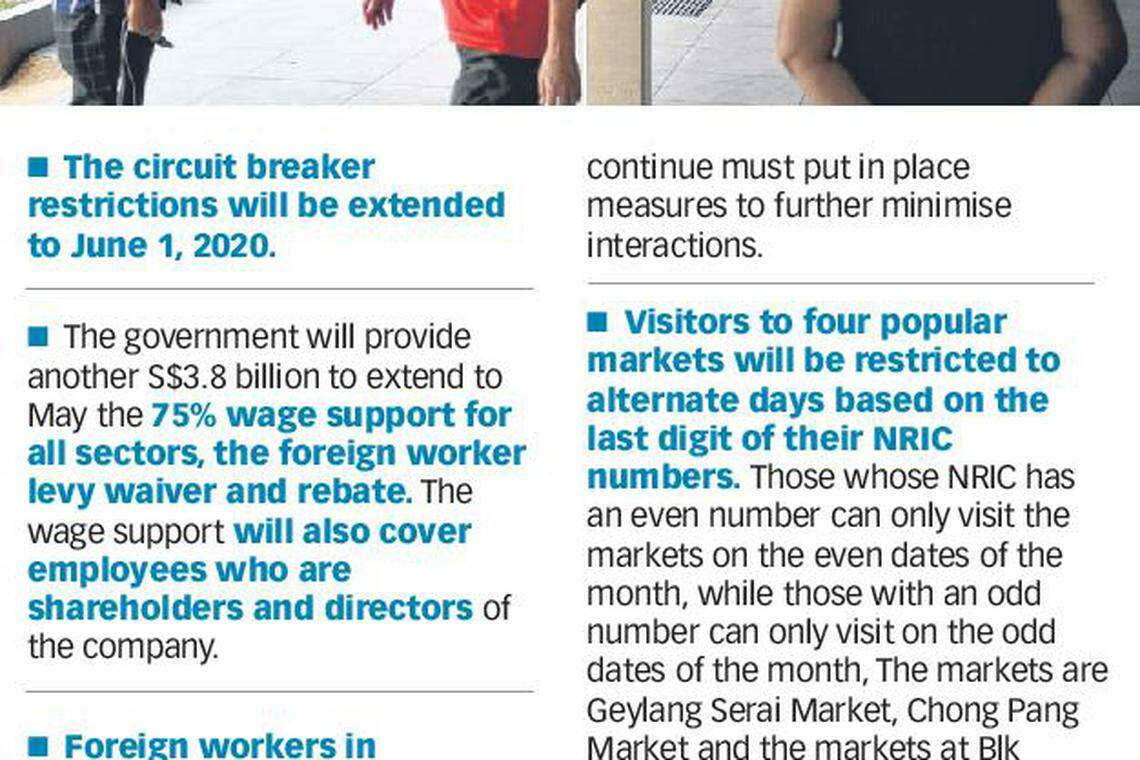S$3.8b in extended support amid tighter curbs against pandemic
But longer circuit breaker sees economists cutting estimates for Singapore's GDP growth


Singapore
WITH the four-week extension to the circuit-breaker measures, S$3.8 billion in extended support will be given to workers and businesses, said Deputy Prime Minister and Finance Minister Heng Swee Keat on Tuesday.
Key measures from the Solidarity Budget will be extended into May, even as the list of essential services is tightened to reduce the number of commuting workers.
Further support notwithstanding, news of the extension had economists cutting their gross domestic product (GDP) growth estimates.
Barclays cut its forecast from -3 per cent to -4.5 per cent, with economist Brian Tan expecting the Ministry of Trade and Industry (MTI) to lower its official forecast range - currently -4 per cent to -1 per cent - by another 2 to 3 percentage points.
OCBC Bank chief economist Selena Ling sees a full-year recession of -6 per cent to -10 per cent, with the second quarter possibly seeing contraction of more than 20 per cent.
SEE ALSO
A NEWSLETTER FOR YOU

Asean Business
Business insights centering on South-east Asia's fast-growing economies.
Mr Heng was speaking at a press conference following Prime Minister Lee Hsien Loong's announcement that the circuit breaker will be extended beyond May 4, till June 1.

The extended measures include the 75 per cent wage subsidy for local workers in all sectors under the Jobs Support Scheme (JSS), which will be extended into May. It applies to the first S$4,600 of gross monthly wages.
Mr Heng urged business leaders to do their best to retain workers. Employers who put local employees on mandatory no-pay-leave or retrench them will not get the enhanced JSS payout for those employees.
But despite continued support, "retrenchments will be inevitable for some employers as they are unable to survive with no cash flow at all", said David Leong, managing director of PeopleWorldwide Consulting.
The JSS will also be extended to cover employees who are shareholders and directors. This will apply to companies registered on or before April 20, and for shareholder-directors with assessable income of S$100,000 or less for Year of Assessment 2019. It is expected to benefit about 50,000 shareholder-directors.
Foreign worker levies due in May will be waived. Employers will get a further S$750 in levy rebates per foreign worker. Earlier-announced measures still apply, such as the Covid-19 Support Grant for those who lose their jobs due to the outbreak, with applications opening on May 1.
As the circuit breaker continues, the list of essential services that can operate will be tightened, said National Development Minister Lawrence Wong, who co-chairs the multi-ministry taskforce on Covid-19.
The aim is to cut the share of the workforce still commuting to work from the current 20 per cent down to 15 per cent, he said. This is important as analysis of the new local cases since the circuit breaker began has shown that many have been working as part of essential services, or have family members who are working.
This workforce cut will take place across all sectors of the economy, including consumer-facing ones. For instance, there will be a tighter definition of what food and beverage businesses can stay open, and restrictions on selected businesses to further reduce interactions. Affected businesses will be notified by MTI.
"Extending the circuit breaker for another month and expanding the coverage could cost the economy another S$10 billion or about 2 per cent of GDP," said Maybank Kim Eng senior economist Chua Hak Bin.
"The extension will mean a far deeper recession, particularly in the second quarter."
"We are forecasting an economic contraction of 6 per cent for 2020, but the risks is for an even deeper recession given the extension of the circuit breaker measures," he added.
With the circuit breaker now covering seven out of 11 weeks in the second quarter, UOB economist Barnabas Gan sees further downside risks to earlier estimates, especially for construction and services "as more businesses will now be non-operational".
The updated list of essential services is at https://covid.gobusiness.gov.sg/essentialservices.
Businesses which can still operate at their premises must register the workers who need to work on-site, and the number permitted to do so will be reduced to a minimum.
Workplaces that stay open must take measures to avoid virus transmission. All workplaces will be required to have a system that logs the entry and exit of workers.
Enforcement agencies will increase inspections of workplaces which remain open and take firm action against non-compliant ones.
To minimise the risk of transmission, foreign workers living in dormitories must stop going to work. This applies to workers from all companies, including those that had earlier obtained exemption to operate during the circuit breaker. MTI will notify affected companies to suspend their operations for this period.
The economic hit from the extension increases the risk that the Monetary Authority of Singapore will ease foreign exchange policy again in October, said Barclays' Mr Tan, noting that a longer disruption "will likely erode the economy's ability to recover after the circuit breaker ends".
"Hopefully, the extended circuit-breaker limits the outbreak to the current quarter, though with such an unprecedented backdrop the recovery is likely to be much prolonged," said Prakash Sakpal, Asia economist at ING, who expects second quarter growth to be hit harder than his initial forecast of a 4.5 per cent fall.
READ MORE:
BT is now on Telegram!
For daily updates on weekdays and specially selected content for the weekend. Subscribe to t.me/BizTimes
Economy & Policy
Tripartism and trust will help Singapore navigate a world ‘fraught with uncertainties’: Tan See Leng
Daily Debrief: What Happened Today (Apr 26)
Singapore must prepare for slower growth at higher costs: MAS
Outgoing Singapore, Indonesia leaders to hold their final retreat in Bogor on Apr 29
Singapore factory output reverses into negative territory in March, down 9.2%
Singapore’s growth should strengthen to ‘around potential rate’, output gap to close by end-2024: MAS
